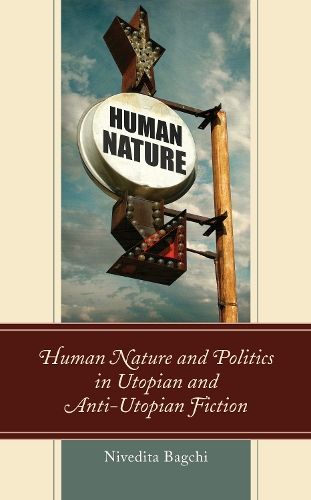
Human Nature and Politics in Utopian and Anti-Utopian Fiction
(Hardback)
Publishing Details
Human Nature and Politics in Utopian and Anti-Utopian Fiction
By (Author) Nivedita Bagchi
Bloomsbury Publishing PLC
Lexington Books
15th October 2018
United States
Classifications
Professional and Scholarly
Non Fiction
Politics and government
Literary studies: general
809.93372
Physical Properties
Hardback
100
Width 159mm, Height 229mm, Spine 14mm
327g
Description
While the interest in anti-utopias has exploded over the years, issues of human nature rarely make it into the discussion of these works of literature. Yet conceptions of human nature play a key role in both the utopian belief that the perfect political system can be achieved and in the anti-utopian conviction that an ideal state is neither possible nor desirable, and would simply lead to a repressive state. This book examines two well-known utopias and two anti-utopias to draw out their conceptions of human nature and show that these conceptions are directly related to their views on politics. It shows that utopians emphasize that human nature is knowable, predictable, and therefore, open to manipulation and/or suppression. Anti-utopians, on the other hand, make the claim that human nature is not entirely knowable or predictable. While they worry about the power of the state to manipulate human nature, they also make the case that the natural recalcitrance and unpredictability of human beings would lead inevitably to a search for freedom and individuality and, therefore, to a clash between the state and the individual in the supposedly ideal state. Ultimately, therefore, these anti-utopians suggest a new conception of human beings as people who value the power to choose their own ends and are unable to entirely suppress their desire for freedom. These two conceptions of human nature lead to two dramatically different conceptions of politics. Utopians see the possibility of manipulating human nature to create an ideal political system which synthesizes all political values and issues while anti-utopians reject both the possibility and desirability of an ideal political system and make the case for providing freedom of choice for all people.
Reviews
Human Nature and Politics in Utopian and Anti-Utopian Fiction is more than a book about idealistic and pessimistic fictional writers. Bagchi skillfully considers whether human nature is a guide or a straight jacket for deciding how best to act. If nature does not direct choice, are we wise enough to construct a good society or will unrestrained freedoms lead to horrifying results As Bagchi points out, the answers to these questions will decide our political destiny. -- James Pontuso, Hampden-Sydney College
Bagchis dispassionate analysis of utopian and dystopian fiction shows how these genres help us better understand ourselves. Utopias reflect humanitys perennial quest for a harmonious and stable worlda world quite unlike our own. Dystopias chasten utopian hopes, insisting on the recalcitrance of human nature and its resistance to the social engineering necessary to pursue utopia. For Bagchi, the worlds created by More, Bellamy, Huxley, Orwell, and Le Guin are so many invitations to consider the deepest questions of human nature and politics. -- Sara Henary, Missouri State University
Bagchi provokes readers of utopias/dystopias to describe and evaluate how their authors have framed what people are made of and are capable of as a subject of intense interest and interdisciplinary heft. Using classic texts and deep insights in political science, philosophy, and psychology, she provides an indispensable analytical structure for reconsidering all texts on the utopian/anti-utopian/dystopia continuum. As this genre (broadly considered) of texts grows in number and importance to readers and viewers in our current era of critique of what is and what can be, her approach is rich, revelatory, and critical to students and teachers. -- Kim McCollum-Clark, Millersville University
Author Bio
Nivedita Bagchi is professor at Millersville University of Pennsylvania
